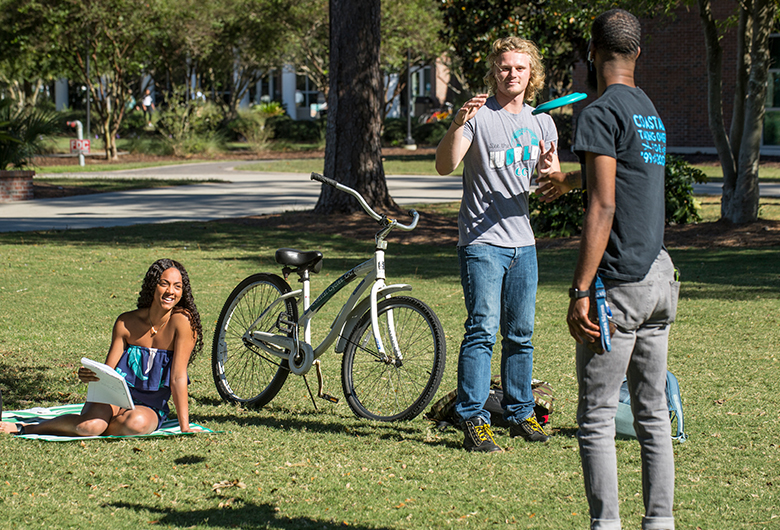Due to the new FAFSA process and the delays in schools receiving FAFSA applications, Financial Aid & Scholarships will not start reviewing appeal requests for the 2024-2025 academic year until we receive FAFSA application in mid-late April. Any requests submitted prior to that will need to be resubmitted for consideration.
The FAFSA requests demographic and income information that sometimes does not give students the opportunity to explain a circumstance that may impact his or her ability to pay for college. Some examples include students who are unable to provide parental information due to unusual circumstances and/or when the FAFSA is not an accurate depiction of the household financial status based on special circumstances. Students may submit a Professional Judgment Appeal to request that CCU’s Financial Aid Administrators take some special or unusual circumstances into account to do a reassessment of the FAFSA. The Department of Education does allow CCU the ability to consider adjustments to a student’s FAFSA when special or unusual circumstances exist, but in limited scenarios. These changes may make a difference in a student’s Dependency Status or Student Aid Index (SAI). If you feel you have a special or unusual circumstance, please explore the information below for further assistance or specifics that might apply to your circumstance. You may also contact a financial aid counselor to discuss if a Professional Judgment Appeal might benefit you.
What qualifies as a Special/Unusual Circumstance?
When determining financial aid eligibility, the following may qualify as special circumstances:
- Loss or reduction of employment, wages, or unemployment compensation
- Exceptional medical and/or dental expenses
- Expenses for a computer purchase (one-time allowance)
- Exceptional housing costs above and beyond the school’s Cost of Attendance
- Divorce or separation that occurred after the FAFSA was filed
- Death of a parent or spouse that occurred after the FAFSA was filed
- An abusive family environment
- Abandonment and/or estrangement by parents
- Parents cannot be located
- Cannot provide parental information for the FAFSA
What does not qualify as a Special Circumstance?
The following circumstances would not be considered special circumstances:
- Parents refuse to financially support the student
- Parents are unwilling to provide verification information
- Parents do not claim the student as a dependent for income tax purposes
- High debt
- High routine household expenses
- Voluntary Income Loss
- One-time income from 401K withdrawals, gambling winnings, etc.
- Higher scholarship offers at other Universities
If you have experienced one of the circumstances above, Financial Aid and Scholarships may be able to reassess your Financial Aid Application. See the applicable section below for instructions on submitting a request.
Loss/Change in Income Appeals
FAFSA uses income information from two year’s prior. Many families can have income changes in two years. If your current income is significantly less than what is reported on the FAFSA, you may consider submitting a request for an appeal review.
To help you determine if submitting an appeal may increase your financial aid offer, please consider the following:
- Coastal Carolina University only awards institutional funds through merit awards and need-based awards. Typically, institutional awards are not eligible for an increase based on this type of review.
- Most students who submit a review are seeking to see if they qualify for additional federal aid. If you are already receiving the maximum Pell Grant amount, an appeal will not benefit you as your current FAFSA reflects maximum Pell Grant eligibility. This number is not a dollar amount of aid eligibility or what your family is expected to provide.
- Institutional policy typically requires a 4-month waiting period from the time of the loss of income to complete any reviews.
- In comparing your current income to the FAFSA, consider gross year-to-date pay, severance pay, state unemployment, federal supplemental unemployment, and projected future employment.
We recommend you chat with a financial aid counselor to determine if an appeal will benefit you. You can also use the Federal Student Aid Estimator to complete a preliminary calculation using your current year's income projection for calculation purposes. If you determine you may qualify for an adjustment, please submit our Parent Change in Income or Student Change in Income form*, required supporting documentation as explained on the form, and a typed, brief summary of the special circumstance(s) surrounding the appeal.
*Available soon
Please do not submit tax information (tax returns, W2's, tax return transcripts) unless specifically requested by our office! Students who submit tax documents and/or an appeal for loss of income are consenting to being institutionally selected for verification (if not selected when filling out the FAFSA) and are required to complete the process to receive aid, regardless of the appeal outcome.
Dependency Override/Unusual Circumstances Appeal
Most students entering a postsecondary school straight from high school are considered financially dependent on their parents unless they meet one of the following criteria to be considered independent:
- 24 years of age or older by January 1st of the school year for which the student is applying for aid.
- Married or separated but not divorced.
- Working towards a master’s or doctorate degree.
- Have children or dependents who live with them and receive more than half their support.
- Currently serving on active duty in the U.S. armed forces for purposes other than training.
- A veteran of the U.S. armed forces.
Students who do not meet one of the criteria above are typically considered dependent for financial aid purposes. This means their parents must provide their financial information on the FAFSA. If you have unusual circumstances which prevent you from providing your parents information on the FAFSA and do not meet one of the criteria above, please submit a 2024-25 Dependency Override form, a letter explaining the level of contact (or lack thereof) with each of your biological or adoptive parents. You must also include a signed letter of support from someone who is aware of your situation and supporting documentation. Submit all documents to finaid@coastal.edu, or secure upload to www.coastal.edu/aidupload. If you would like to discuss your circumstances with a financial aid counselor, contact us at (843) 349-2313 or finaid@coastal.edu.
Other Unusual Circumstances
The following criteria also qualify students to be considered independent:
- An orphan, in foster care, or a ward of the court at any time since age 13.
- An emancipated minor or in legal guardianship as determined by a court.
- An unaccompanied youth who is homeless or self-supporting and at risk of being homeless.
Students who believe they meet one of the criteria above should submit a 2024-25 Dependency Status Clarification Form or the 2024-25 Unaccompanied Homeless Youth form with supporting documentation. You may also call (843) 349-2313 to speak with a counselor and discuss next steps.
How Do I Submit an Appeal?
- Students who believe they meet one of the criteria above are encouraged to talk to a financial aid counselor to determine the next steps.
- Students/Parents will submit the appropriate appeal form, typed narrative explaining the reason or the appeal, and all supporting documentation.
- An electronic request for your appeal paperwork and any additional requests will be added to the “Required Financial Aid Documents” link in MyCCU.
What Happens After I Submit an Appeal?
Once submitted, a staff member will review your request for an appeal within 14 business days to determine if a Professional Judgment Appeal is appropriate. Upon review, additional forms and information may be required. Verification must also be completed for all loss/change in income appeals before the appeal can be reviewed. Please note that all correspondence regarding additional required information will go to the student’s CCU email. Required documents can also be accessed from MyCCU. Appeal decisions can take upwards of 6-8 weeks, especially during peak times. Appeals decisions are typically not final until after the start of school in the fall, as summer processing is devoted to finalizing initial aid packages for all students. Appeal decisions are sent out via mail. If the appeal is approved, aid will be adjusted 7-10 business days after the decision.
Important Notes:
- Not all appeals result in additional aid. In some cases, changes do not make students eligible for more grants or additional loan amounts. In rare cases, students may lose grant eligibility.
- Not all appeals are approved. If you appeal, your appeal could be denied. This is a final determination and cannot be contested at a higher level. The Department of Education cannot overturn the committee’s decision.
- While waiting for an appeal decision, students should continue with their current payment plans with the Office of Student Accounts until decisions are final.
- Students/Parents submitting this request after September 30th may also be asked to file their current year taxes before finalizing a professional judgment review decision.





